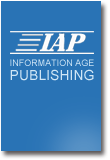
Teaching English Language Learners with Exceptionalities
A Collection of Research-Based Practices
Edited by:
Sara Jozwik Ed. D., University of Wisconsin-Milwaukee
Miranda Lin, Illinois State University
A volume in the series: Chinese American Educational Research and Development Association Book Series. Editor(s): Guofang Wan, Loyola University Chicago.
Call for Chapters
Proposals Submission Deadline: June 15, 2019Full Chapters Due: October. 31, 2019
Submission Date to the publisher: January 31, 2020
Introduction
This edited book fills a gap by providing action steps that surround the question “What now?” as it pertains to teachers who must plan and provide intensive literacy instruction to meet exceptional needs of English Learners. The purpose of the prospective book is to equip teachers and administrators with research-based strategies and procedures for implementing effective literacy instruction in inclusive contexts. Specifically, this entails offering guidance on balancing and using universal design for learning to implement general curriculum alongside the use of individualized strategies that meet targeted needs related to phonemic awareness, phonics, vocabulary, reading fluency, reading comprehension, and written expression. This edited book will expand the knowledge base to address literacy development for exceptional English Learners while offering concrete guidance around a topic that is relevant to a wide range of teachers and school-based administrators.
We invite prospective authors to submit proposals on a variety of issues concerning teaching English to learners with exceptional needs. We welcome a variety of chapters such as successful program implementation, as well as research studies. We also welcome papers that address some of the current challenges and dilemmas of teaching English learners with exceptional needs in all cultural and social contexts, including perspectives from different countries. The following are some critical issues that papers might consider:
* How can we raise the overall quality of teacher education programs to prepare teacher candidates who will be working culturally and linguistically diverse exceptional learners?
* What types of assessment of English learners with exceptional needs are appropriate to demonstrate their abilities?
* How can we help both in-service and pre-service teachers to develop practices grounded in empathy and social democracy?
* To what extent should in-depth clinical experiences be integrated into teacher education to ensure teacher candidates are 1) equipped with the knowledge and skills needed in the field, 2) aware of the sociopolitical issues related to teaching English to learners with exceptional needs, 3) becoming self-reflective in their use of instructional strategies?
* To what extent should the administrators, teachers, and parents work together to ensure the quality of the education and services that meets the needs of the English learners with exceptional needs?
Prospective authors are invited to submit a 1000-1500-word proposal to the editors by June 15, 2019. Proposals should include a cover page, the manuscript proposal, and references. The proposal should be written in accordance with the latest edition of the APA style manual and submitted in Microsoft Word format. The editors will review the chapter proposals and authors will be notified by August 31, 2019. Final drafts of all chapters will be due by Oct. 31, 2019.
On the cover page, please provide the name of each author, title, current position, institution, work mailing address, phone number, e-mail address, and a short (3-4 sentences) biographical statement.
In the proposal, please include a proposed title for the chapter. An organizational structure for the manuscript (including key headings/subheadings) should clearly delineate the content of the chapter. Within the proposal, please cite 2-3 key texts or papers that support your work. We will invite accepted chapter authors to conduct a blind review of one or two papers in order to improve the overall quality of the final text.
Should you have any questions, please feel free to contact the editors.
BUY ONLINE
- This title is in development and is not yet available to order online. Please call the IAP office for more information: 704.752.9125

CATEGORIES
CLASSIFICATION
RELATED TITLES
-
 Advancing Methodologies to Support Both Summative and Formative Assessments
Advancing Methodologies to Support Both Summative and Formative Assessments
-
 Critical Issues in Early Childhood Teacher Education
Volume 1 - US Perspectives
Critical Issues in Early Childhood Teacher Education
Volume 1 - US Perspectives
-
 Critical Issues in Early Childhood Teacher Education
Volume 2-International Perspectives
Critical Issues in Early Childhood Teacher Education
Volume 2-International Perspectives
-
 Gifted Education in Asia
Problems and Prospects
Gifted Education in Asia
Problems and Prospects
-
 Model Minority Myth Revisited
An Interdisciplinary Approach to Demystifying Asian American Educational Experiences
Model Minority Myth Revisited
An Interdisciplinary Approach to Demystifying Asian American Educational Experiences
-
 Rekindling Embers of the Soul
An Examination of Spirituality Issues Relating to Teacher Education
Rekindling Embers of the Soul
An Examination of Spirituality Issues Relating to Teacher Education
-
 Teaching and Learning Chinese
Issues and Perspectives
Teaching and Learning Chinese
Issues and Perspectives
